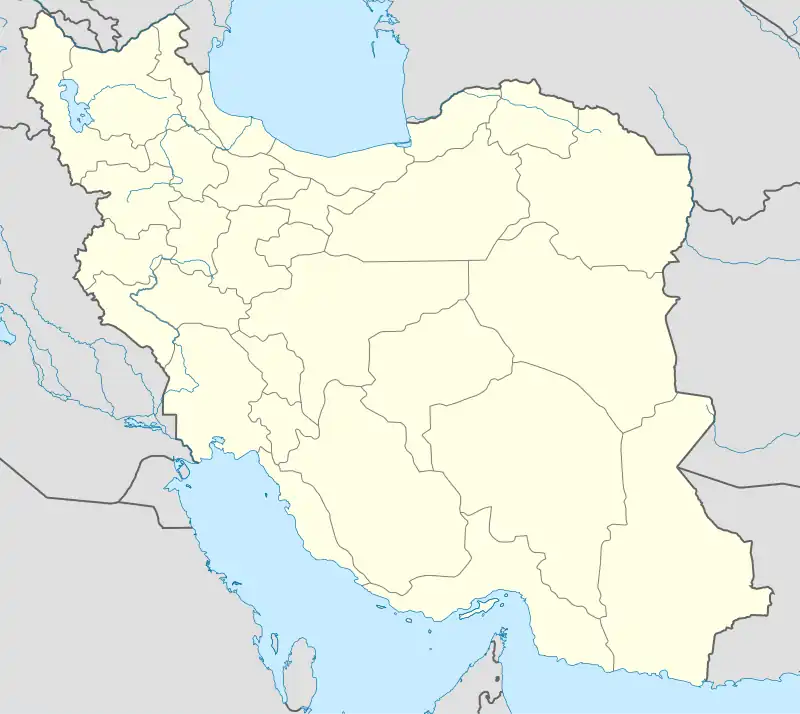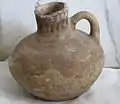Zarrin Shahr
Persian: زرینشهر | |
|---|---|
City | |
 Zarrin Shahr | |
| Coordinates: 32°23′20″N 51°22′24″E / 32.38889°N 51.37333°E[1] | |
| Country | Iran |
| Province | Isfahan |
| County | Lenjan |
| District | Central |
| Population (2016)[2] | |
| • Total | 55,817 |
| Time zone | UTC+3:30 (IRST) |
Zarrin Shahr (Persian: زرینشهر, also Romanized as Zarīn Shahr; also known as Qal‘eh Rīz, Rīz-e Lanjān, and Rīz)[3] is a city in the Central District of Lenjan County, Isfahan province, Iran, and serves as both capital of the county and of the district. It is in the southwest of the county.
Etymology
Until the 1970s Zarrinshahr was known as Riz-e Lenjan (or simply Riz for the locals). The name changed to Zarrinshahr as a result of what seems to be merely bureaucratic decision making.[4]
History
The center of Lanjan county was renamed to Zarinshahr due to its neighbors to Zayandeh Roud in 1336 according to the resolution of Riz city council, inspired by the ancient name of Zarinroud. According to archaeologists, the objects discovered in the hills of Bagh Mahmud, Bagh Daraz and hills Kafer, which are located in the south of this city and in the neighbors of ancient riz canal , come from the heart of a few ancient hills along the Zayandeh Rood route, which historically It is the period with Silk Kashan civilization.

Rizi scholars
The author of the book Hayat al-Nufus in the Philosophy of east between 673 and 675 AH, a copy of which is available in Tehran University Library with retrieval number 1.2.4.

- Zain al-Abidin Rizi
The scribe of the documents of al-Ahkam fi Sharh Shariah al-Islam on Monday, 26 Rabi al-Awwal 1061 AH, which is available in the library of Ibn Maskawayh under retrieval number 2857.
- Mohammad Moghim Rizi
Al-Fawaid scribe in the date of Shawwal 1042 AH, which is available in the library of Ayatollah Murashi Najafi under retrieval number 1/3028
Geography and climate
Zarrinshahr is located in the lush plain of the Zayandeh Rood (or Zayandeh River), not too far from the Zagros mountain range. The climate is temperate, the four seasons occur regularly and are clearly differentiated. It experiences a few snowfalls a year but not much rain. Summer is hot and temperatures can hit 36 on some days. Summer however is quite pleasant due to lack of humidity and low temperatures at night. The locals often hit the riverside at night for dinner or after dinner tea.
Demographics
At the 2006 census, its population was 55,984 in 15,154 households.[5] The following census in 2011 counted 60,118 people in 17,920 households.[6] The latest census in 2016 showed a population of 55,817 people in 17,821 households.[2]
Expatriate Zohreh Bayatrizi describes the city as multi-cultural. The two main groups are Persians, who have lived in the area at least since 12th century AD, and Azeri Turks, who were forcibly settled in Riz in the 17th century by the Safavid rulers.[7]
In the past 30 years people, from various parts of Iran have moved to Zarrin Shahr to work in the nearby steel mill factory (zobe ahan). The single largest immigrant group are the Bakhtiaris from the nearby province of Chahar Mahal Va Bakhtiari.[7] The second largest group are from Khuzestan after the onset of the Iran–Iraq War in 1980. Most of the latter were placed in camps just outside the city and most have returned home after the ceasefire.
Sports
Zarrin Shahr has Greco-Roman wrestling and martial arts teams that are competitive nationally.
Gallery
Nature of Zarrin Shahr
References
- ↑ OpenStreetMap contributors (19 June 2023). "Zarrin Shahr, Lenjan County" (Map). OpenStreetMap. Retrieved 19 June 2023.
- 1 2 "Census of the Islamic Republic of Iran, 1395 (2016)". AMAR (in Persian). The Statistical Center of Iran. p. 10. Archived from the original (Excel) on 19 October 2020. Retrieved 19 December 2022.
- ↑ Zarrin Shahr can be found at GEOnet Names Server, at this link, by opening the Advanced Search box, entering "6012981" in the "Unique Feature Id" form, and clicking on "Search Database".
- ↑ Ghaderi, Sasan 1378 Lenjan. Isfahan: Range-Ab, p17
- ↑ "Census of the Islamic Republic of Iran, 1385 (2006)". AMAR (in Persian). The Statistical Center of Iran. p. 10. Archived from the original (Excel) on 20 September 2011. Retrieved 25 September 2022.
- ↑ "Census of the Islamic Republic of Iran, 1390 (2011)" (Excel). Iran Data Portal (in Persian). The Statistical Center of Iran. p. 10. Retrieved 19 December 2022.
- 1 2 Ghaderi, Sasan 1378 Lenjan. Isfahan: Range-Ab, 27








